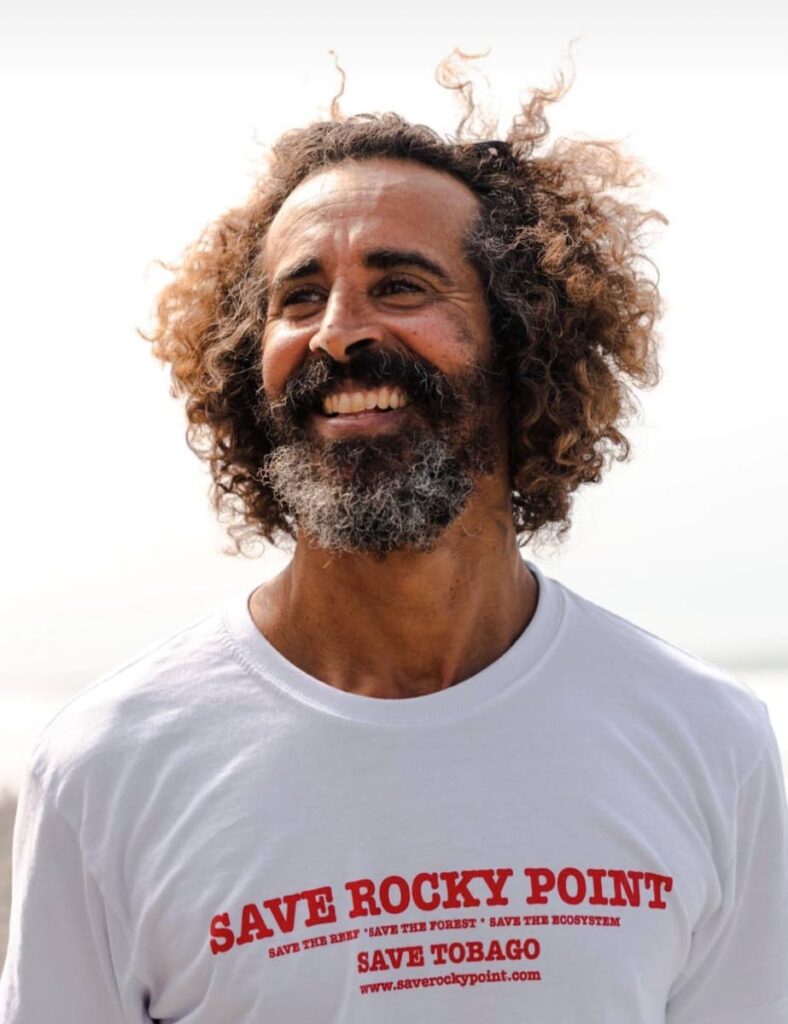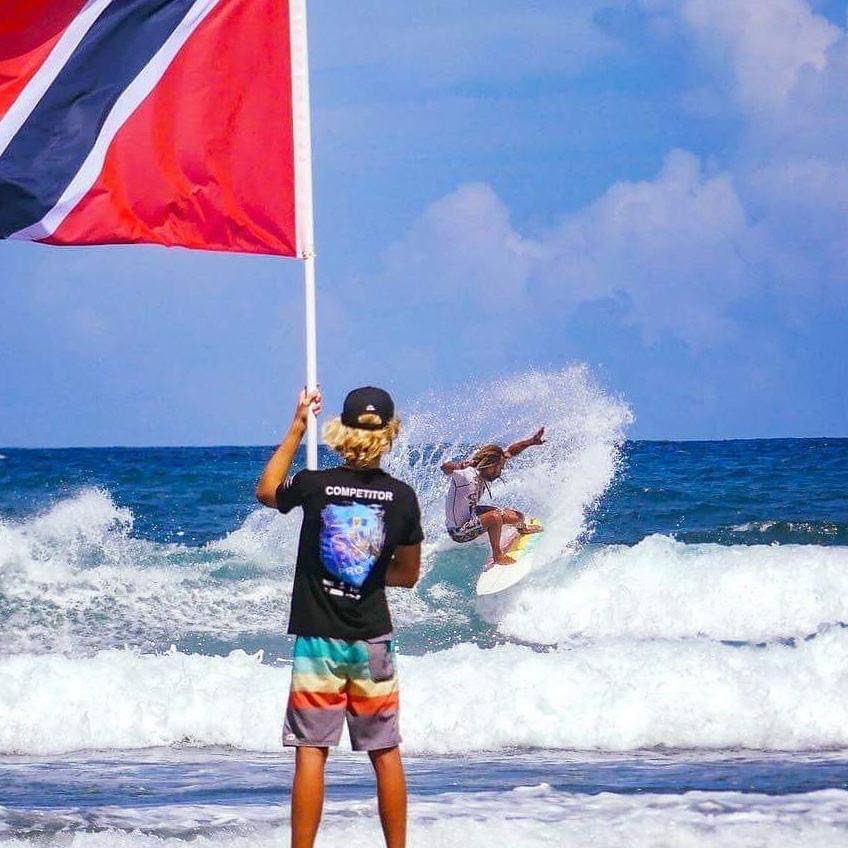The Churchill of the surfboard

AS TOLD TO BC PIRES
My name is Jason Apparacio and I am the national surfing team coach.
My parents were both mixed-race Trinis who met in England, where I was born.
My father, Stanley Apparicio, is Spanish Creole. And my mother, Helen de Couteau, is French Creole. I’m the original red man from Trini.
We moved back to Trinidad when I was one.
I’m married to Lorenza Apparacio from Reunion Island, next to Madagascar. I met her when she was working the event I went to compete in.
I have three daughters. My eldest, Jonah, from my first marriage, is going to be 21 soon – we thought she was going to be a boy and we decided to keep the name! Amy, my second, is 19 and my stepdaughter Umalee Duez just turned 15.
I lived my whole childhood in Sinanan Gardens, lower Santa Cruz, fishing in the rivers and doing everything outside. We built the first skate ramp for skateboards and BMX bikes and all the kids used to come over by me to do the stuff we saw on TV from America.
I lived next to one of my childhood best friends, Ato Boldon. Our parents were close. We were at school together at Newtown Boys’ RC.
The funny thing is, I was a faster runner than Ato back then.
I did my common entrance in Dunross Prep because we moved to Westmoorings and then went to Fatima College.
I didn’t really like school because I was a little dyslexic.
But I was always in the top five of any sport we played. Football, cricket, basketball, tennis, table tennis, swimming, anything. At 13 or 14, I was playing on the colts team (effectively the school second XI).
I was raised Catholic, but my parents weren’t super strong on it.
After my first marriage ended, I went into a very dark side and needed help, so I ran I ran to the hills in Wharf Trace, to the Rastamen. I spent a lot of time with the Nyabinghis, the drummers. It felt good. I was kind of practising the Rasta religion.
I don’t want to say I made my own religion up but I took the best out of everything. I think karma is my God: I treat people how I would want to be treated.
I totally enjoyed Fatima, but at the end of form two, my family migrated to Florida.
I was devastated. I didn’t have brothers or sisters. So it was just me.
And then my parents divorced. I was 15, 16 and my whole world got shattered.
That’s when I really went into the surf. To forget all that stuff.
I became a surfer in Trinidad. I was about ten or 11 when I stood up on my first board at Maracas.
I became TT boys U-14 national champ in 1988. And it was that same summer we moved to Florida.
I stopped counting how many countries I’ve been to through surfing. But it’s definitely over a 100.

-
Obviously I’m moving around the coastlines. I’ve surfed Italy, Israel, Texas and the Red Sea.
I’m a surfer. That’s what I was brought into this world to do. And that’s what I’ll continue to do until I’m dead.
In Florida, I could surf on the weekends only, so I tried out for the younger school football team. They put me on the varsity team, the seniors. And I was a freshman.
The school was happy. My dad was happy because the school was already talking about college scholarships!
But I wasn’t happy. I told my dad I was done with football and wanted to be a surfer. He told me I would have to do it on my own. I was 14.
I went to a surf shop and said, “Sponsor me. I’m going to be the best surfer you’ve ever sponsored in the next three years!”
And they were watching this little brown-skinned boy with this Trini accent.
But I came second in the first contest and won the next one! Now my father tells me, “Wow! Well done, son!”
I started to get paid as a surfer at age 16, 17 and it’s still going.
I’ve done other jobs, when things were hard and I had to get extra money. Like valet parking or working in surf shops or surfboard factories, to learn other aspects of the tools of my trade.
The last time I competed as a professional was in 2006 in Portugal.
I lost my contracts around 2012 and I thought, “Do I have to go work in KFC now?” I did go into a little depression, because I’d put everything into surfing.
That’s why your parents say, “Have a college degree!” Because it all makes sense. I had no degree in absolutely anything – but I knew I had a doctorate in surf. By just doing it.
I officially became a coach after moving to Martinique, because my wife, Lorenza, is French. I got a job as the contest director of a world qualifying series, a big elite event. (A surf club) wanted me to be their coach. They asked if I had a certificate and I said yes.
And then I ran to Costa Rica and did it quick-quick – I entered at the highest level as a former professional surfer.
I started developing Martinique and Guadeloupe, then moved on to Barbados, doing clinics there and training the junior team.
I train athletes for Trinidad and Tobago, Barbados, the Dominican Republic, Martinique, Guadeloupe and St Barts. And I am now moving on to Costa Rica.
The best thing about a life in surfing is the healthy lifestyle. I’m 49 and I feel like I’m 27.
I’ve had riders under mental depression and I know it’s a big thing in this world.
But the surf just takes care of you. It keeps you mentally healthy.
The best thing about coaching is surfing is such an independent, selfish sport, it’s always, “Me-me-me-me-me! I’m going to win! How much money do you have for me?”
I’ve done that part. And now coaching is the part where I’m giving it back!
Obviously I have to make money out of it, but I work more than I get. And I’m okay with that. ‘Cause I love what I do. For me, that giving part is better than winning.
As a coach, I feel like I’ve never worked.
The bad thing about surfing is I’ve got hepatitis A from dirty water, I’ve got covid maybe five times and many other diseases from travelling so much.
But those things are minor, compared to the big picture. Overall, what surfing gives you, the pros way more than outweigh the cons.
I’m coaching this super-talented little girl and I don’t want what happened to me to happen to her.
I get why Trinidad never really put a grasp on me as a professional surfer. I was born in England. I moved to the States when I was 12, 13.
But I’ve always felt like I represented Trinidad and Tobago, never England, never America.
Kevin Kenny, retired now, was the marketing director at Angostura. I spilt my guts out to him and he said, “We’re going to sponsor you under Angostura.”
They gave me $60k – a lot of money at that time. I think I was their second biggest contract after Brian Lara. It went to $80k and then $100k.
If a company in Trinidad could do that, why couldn’t the Ministry of Sports see that? And now, so many years later, we have the same thing happening with this little Trini girl who is a phenom!
I travel the world scouting surfers for companies and I’m trying to tell Trinidad we have a new Kelly Slater! She’s going to be amazing, and if we don’t take care of her (another country) will take her. And she’ll be like Nicki Minaj and all these people that had Trinidad connections (but we lost).
We need to help all our athletes out. Because they don’t get financial help at home and it’s really sad.
To me, a Trini is a very versatile person. He can communicate with the street person and with the hierarchies out there.
To me, Trinidad and Tobago obviously means a lot because I am a Trinidadian.
But it could also leave a funny taste in my mouth because of the weird way the country is going.
Read the full version of this feature on Friday evening at www.BCPires.com

Comments
"The Churchill of the surfboard"